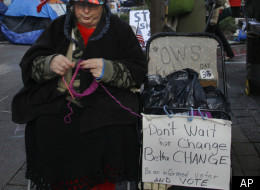WASHINGTON -- Democrats' strategy for keeping control of the Senate next year includes running on the message of Occupy Wall Street, minus the drums and hemp necklaces.
Even in conservative states like Nebraska and Montana, candidates will be talking about income inequality and corporate excess, said Democratic Senatorial Campaign Committee director Guy Cecil on Thursday.
"Whether they go to an Occupy Wall Street [protest], that'll be up to them," Cecil said at a breakfast hosted by the nonpartisan think tank Third Way. "But I think the message of income disparity, of how do we make sure that working-class families and middle-class families have a chance, how do we make sure their kids get to college, is going to resonate in almost every state."
Similar language is sounding all around the political realm, with Democratic Senate leaders such as Majority Leader Harry Reid (D-Nev.) adding a heavy dose of income equality rhetoric to the current debate on jobs.
But Cecil's admission is the first that the issues animating many of the campers in Manhattan's Zuccotti Park, Washington's Freedom Plaza and other Occupy sites will be key points on the campaign trail.
"I think that the Occupy Wall Street movement is popular because there is a general frustration at the growing income disparity in our country," Cecil said. "Even before we were in this recession, when the economy was growing, middle-class income was shrinking, the cost of health care was going up, the cost of a college education was going up. So this frustration exists far beyond just the folks that come out into Freedom Plaza."
He continued, "I do think our candidates will talk about income disparity, talk about the level playing field. They will talk about the issues around corporate tax deductions and whether or not we should eliminate those as a way to pay down the debt and make sure we can afford unemployment benefits.

"The income disparity is no less in Nebraska and Montana than it is in Massachusetts or somewhere else," Cecil said, noting that Nebraska Sen. Ben Nelson, "who we all know is a conservative Democrat, is running on the issues of Medicare and Social Security."
But don't expect the diffuse, leaderless Occupy movement and the Democratic Senatorial Campaign Committee to embrace.
"There's not a lot of interest on their part to have us," Cecil noted, later telling The Huffington Post that the anti-Wall Street message is not necessarily attached to its scruffier messengers.
"I separate the message of the Occupy Wall Street movement from what's happening in individual squares," he said, adding that the message is something many people agree with, even if they wouldn't join an occupation. "The reason it's resonating is not because of individual protesters; it's because people are ready to hear that message."
Bill Schneider, a Third Way resident scholar, said there's a downside to political candidates latching onto aggressive movements from the left too tightly. He pointed to the failure of George McGovern's White House bid in 1972, noting that McGovern strongly embraced the anti-war movement at a time when the Vietnam War was deeply unpopular.
Yet just 38 percent of the country voted for the anti-war candidate. Schneider said a big reason uncovered in the research was that most Americans were not too fond of the protesters either.
"What they found was most voters were anti-war and anti-war protesters," Schneider said. "That's the risk that the Occupy Wall Street movement runs."

